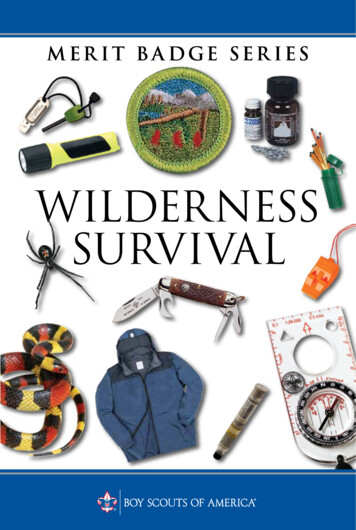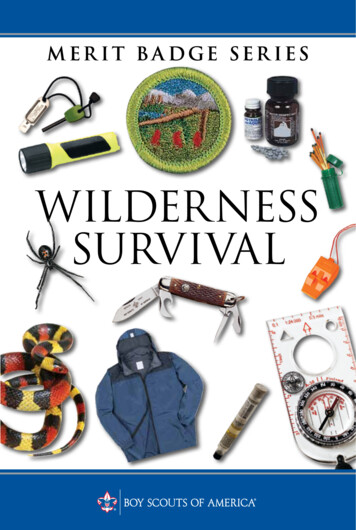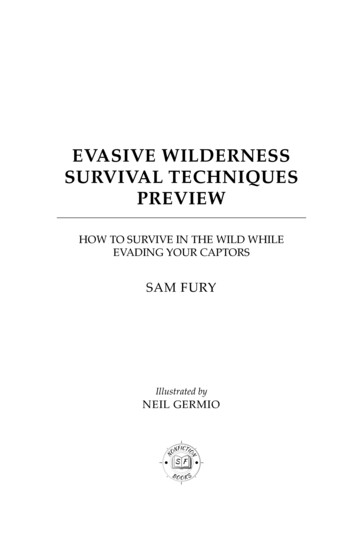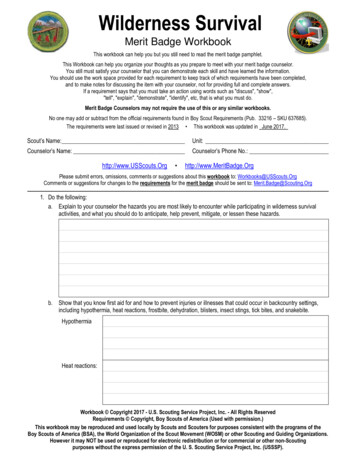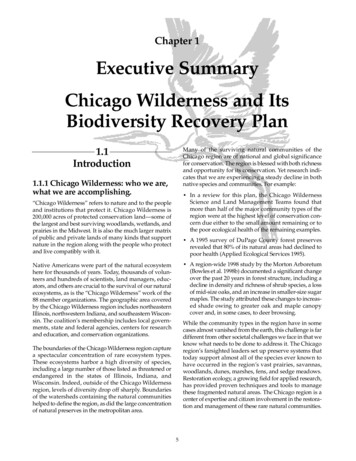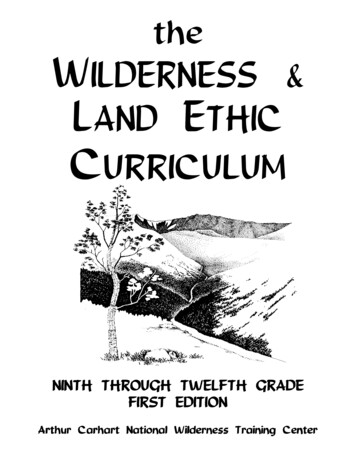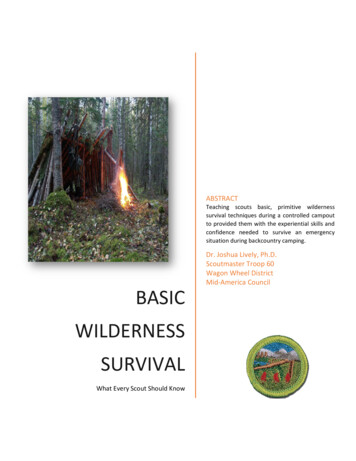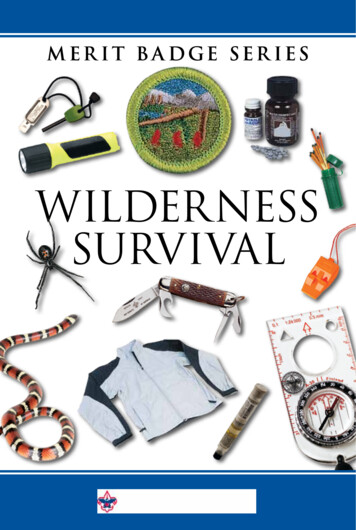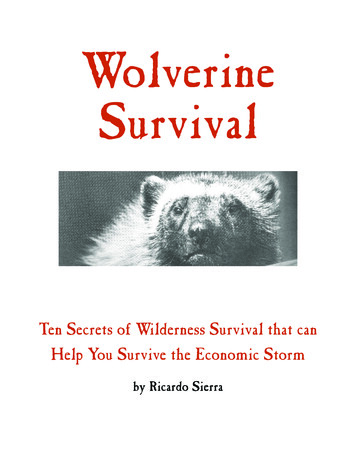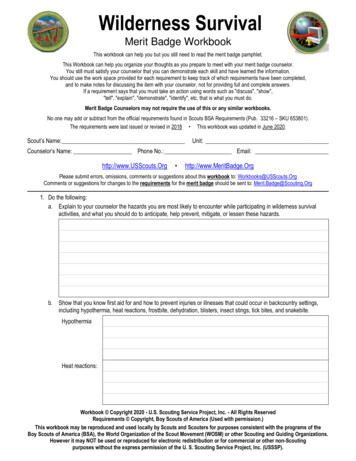
Transcription
Wilderness SurvivalMerit Badge WorkbookThis workbook can help you but you still need to read the merit badge pamphlet.This Workbook can help you organize your thoughts as you prepare to meet with your merit badge counselor.You still must satisfy your counselor that you can demonstrate each skill and have learned the information.You should use the work space provided for each requirement to keep track of which requirements have been completed,and to make notes for discussing the item with your counselor, not for providing full and complete answers.If a requirement says that you must take an action using words such as "discuss", "show","tell", "explain", "demonstrate", "identify", etc, that is what you must do.Merit Badge Counselors may not require the use of this or any similar workbooks.No one may add or subtract from the official requirements found in Scouts BSA Requirements (Pub. 33216 – SKU 653801).The requirements were last issued or revised in 2018 This workbook was updated in June 2020.Scout’s Name:Unit:Counselor’s Name: Phone No.: Email:http://www.USScouts.Org http://www.MeritBadge.OrgPlease submit errors, omissions, comments or suggestions about this workbook to: Workbooks@USScouts.OrgComments or suggestions for changes to the requirements for the merit badge should be sent to: Merit.Badge@Scouting.Org1. Do the following:a. Explain to your counselor the hazards you are most likely to encounter while participating in wilderness survivalactivities, and what you should do to anticipate, help prevent, mitigate, or lessen these hazards.b. Show that you know first aid for and how to prevent injuries or illnesses that could occur in backcountry settings,including hypothermia, heat reactions, frostbite, dehydration, blisters, insect stings, tick bites, and snakebite.HypothermiaHeat reactions:Workbook Copyright 2020 - U.S. Scouting Service Project, Inc. - All Rights ReservedRequirements Copyright, Boy Scouts of America (Used with permission.)This workbook may be reproduced and used locally by Scouts and Scouters for purposes consistent with the programs of theBoy Scouts of America (BSA), the World Organization of the Scout Movement (WOSM) or other Scouting and Guiding Organizations.However it may NOT be used or reproduced for electronic redistribution or for commercial or other non-Scoutingpurposes without the express permission of the U. S. Scouting Service Project, Inc. (USSSP).
Wilderness SurvivalScout's Name:Frostbite:Dehydration:Blisters:Insect stings:Tick bites:Snakebite.2. From memory, list the seven priorities for survival in a backcountry or wilderness location. Explain the importance ofeach one with your counselor. (The space provided here is for you to write out the priorities to help you memorize them.)1.2.3.Wilderness Survival - Merit Badge WorkbookPage. 2 of 7
Wilderness SurvivalScout's Name:4.5.6.7.3. Discuss ways to avoid panic and maintain a high level of morale when lost, and explain why this is important.4. Describe the steps you would take to survive in the following exposure conditions:a.Cold and Snowyb.WetWilderness Survival - Merit Badge WorkbookPage. 3 of 7
Wilderness Survivalc.Hot and Dryd.Windye.At or on the waterScout's Name:5. Put together a personal survival kit and explain how each item in it could be useful.Wilderness Survival - Merit Badge WorkbookPage. 4 of 7
Wilderness SurvivalScout's Name:6. Using three different methods (other than matches), build and light three fires. 1. 2. 3.7. Do the following: a. Show five different ways to attract attention when lost. 1. 2. 3. 4. 5. b. Demonstrate how to use a signal mirror.Wilderness Survival - Merit Badge WorkbookPage. 5 of 7
Wilderness Survival Scout's Name:c. Describe from memory five ground-to-air signals and tell what they mean.(The space provided here is for you to write out the priorities to help you memorize them.)1.2.3.4.5. 8. Improvise a natural shelter. For the purpose of this demonstration, use techniques that have little negative impact on theenvironment. Spend a night in your shelter.9. Explain how to protect yourself from insects, reptiles, bears, and other animals of the local region.Insects:Reptiles:Bears: 10. Demonstrate three ways to treat water found in the outdoors to prepare it for drinking. 1. 2. 3.Wilderness Survival - Merit Badge WorkbookPage. 6 of 7
Wilderness SurvivalScout's Name:11. Show that you know the proper clothing to wear while in the outdoors during extremely hot and cold weather and during wetconditions.Extremely hot weather:Extremely cold weather:Wet conditions:12. Explain why it usually is not wise to eat edible wild plants or wildlife in a wilderness survival situation.When working on merit badges, Scouts and Scouters should be aware of some vital information in the current edition ofthe Guide to Advancement (BSA publication 33088). Important excerpts from that publication can be downloaded meritbadges.pdf.You can download a complete copy of the Guide to Advancement from lderness Survival - Merit Badge WorkbookPage. 7 of 7
Wilderness Survival Scout's Name: _ Wilderness Survival - Merit Badge Workbook Page. 2 of 7 Frostbite: Dehydration: Blisters: Insect stings: Tick bites: Snakebite. 2. From memory, list the seven priorities for survival in a backcountry or wilderness location. Explain the importance of each one with your counselor. (The space provided here .
